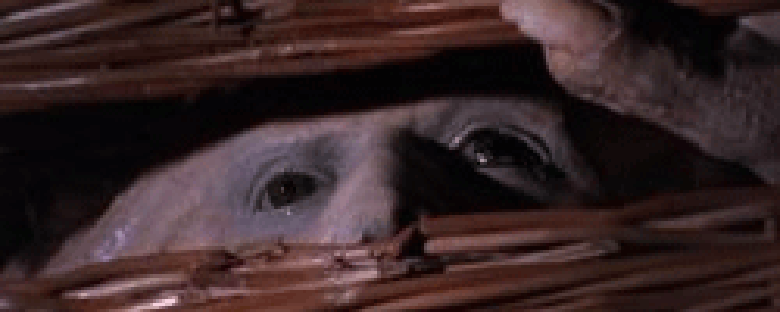Reviews
Frank Henenlotter
USA, 1982
Credits
Review by Thomas Scalzo
Posted on 27 October 2006
Source Video Treasures VHS
Related articles
Features: 31 Days of Horror
A splatter-generation take on the reviled-monster tale, Basket Case modernizes the gothic locales of Frankenstein, The Hunchback of Notre Dame, and the like with scenes of the grimy city, transporting the maltreated centerpiece from crumbling castle to dingy New York City hotel. And while Basket’s Belial is cut from the same cloth as the classic horror showstoppers, writer/director Frank Henenlotter brings the idea of the abhorred abomination to a new level, weaving a tapestry of cruelty about Belial that rivals anything endured by the fiends of yore.
For starters, Belial is only half a man, a living torso with razor-sharp fangs mercilessly ripped from the side of his erstwhile-conjoined twin Duane and kicked to the curb like worthless garbage. Bereft of legs, genitalia, even the ability to speak, Belial is forever trapped in a deformed, inadequate body; and forever doomed to silence. Adding fuel to the fire of Belial’s rage is an inborn telepathic link with his brother Duane; an ability that offers Belial a singular outlet for his repressed thoughts, yet curses him with intimate knowledge of a normal young man’s life. When Duane goes on a date with an attractive receptionist, for example, and happens to sneak a quick kiss, Belial is flooded with the surge of elation flowing through Duane’s mind—and is enraged by his own impotence.
A remarkable achievement of both characterization and special effects, Belial is brought to life through a seamless combination of deft puppetry, grotesque make-up, and impressive stop-motion animation: whether tearing up a hotel room or tearing up someone’s face, he is consistently fascinating and horrifying to watch. Like any effects marvel, however, prolonged screen time would have diluted Belial’s shock value. Thankfully, Henenlotter balances our Belial sightings with a gaggle of colorful ancillary characters, most of whom occupy the seedy hotel in which Belial and Duane take up residence. From the overworked manager, to the buxom nightclub performer who lives down the hall, to the money-hungry neighbor who can’t resist a peak in Belial’s basket, there’s always a fresh face to engage our attention. In addition, as the film’s main narrative thread involves Duane spending his days tracking down the trio of doctors responsible for the brothers’ separation, with Belial safely tucked away in his basket, Henenlotter manages to keep his star off screen just enough to constantly pique our interest for the next blood-soaked Belial sighting.
Overshadowing Belial’s bloody quest for vengeance, however, and adding an emotional complexity that elevates the film far above its low budget, shabby sets, and mediocre acting, is the fraternal dynamic of Duane and Belial. Inextricably linked, both by their telepathic connection and their doctor-killing quest, the boys sincerely care for each other, Duane in particular sacrificing any semblance of a normal life in the service of protecting and providing for his kin. At the same time, however, the intolerable closeness is driving both boys mad—Belial from a confounding mixture of jealousy and frustration at being unable to connect with any other human, and Duane from never having a moment of solitary peace.
As the film charges relentlessly forward, interlacing Belial’s increasingly rage-filled murders with Duane’s subtle efforts to extricate himself from his brother, the intense intimacy of the brother’s relationship becomes untenable, and we arrive at the picture’s pivotal, and most disturbing, scene. Belial, having escaped the confines of his basket, pays a nighttime visit to the provider of Duane’s first kiss. As the girl sleeps, we watch as Belial mounts and roughly fondles her. Awakened by the unexpected sensations, she sights the twisted mass of flesh perched on her midsection and unleashes an earsplitting scream—an act that engenders Belial’s unfathomable fury.
Whether Belial’s actions are the result of years of sexual frustration, innocent curiosity, or a conscious desire to possess the object of Duane’s fancy is unclear. But when Duane bursts through the doorway to find both his brother and his new love bathed in blood, the proverbial gloves are off, and years of repressed rage seethe to the surface. The ensuing confrontation is both vicious and sad, and a tribute to Henelotter’s deft storytelling ability. Despite the facts that Belial has ravaged several people, and Duane has consciously allowed it to happen, we still pity both men and care what happens to them—just as we willingly forgive the transgressions Frankenstein’s monster, Quasimodo, and other abominations of old, and wish them peace, so too do we root for Henenlotter’s ill-fated brothers, and hope they somehow find solace.
We don’t do comments anymore, but you may contact us here or find us on Twitter or Facebook.



